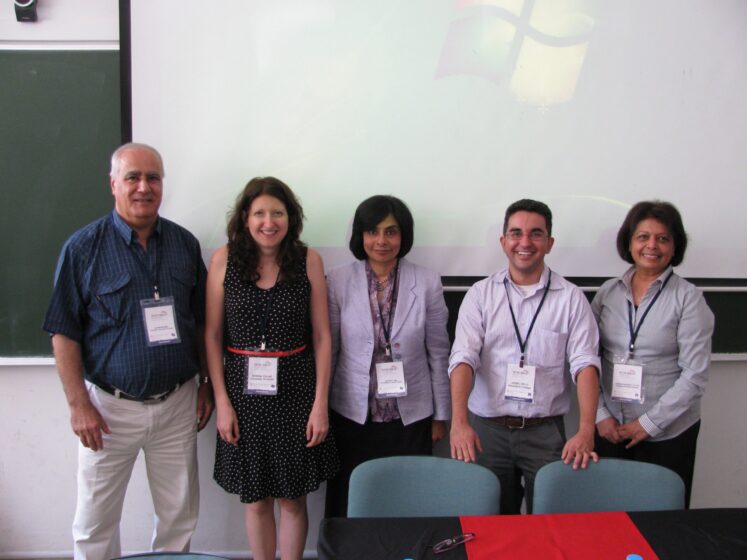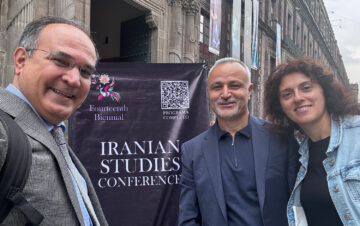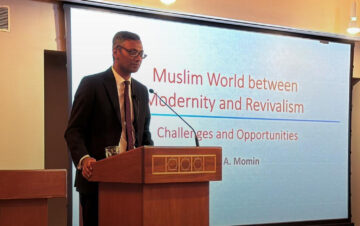Drs Shainool Jiwa and Arzina Lalani presented papers in Ankara, on 18-22 August 2014, as part of a panel at the World Congress for Middle Eastern Studies (WOCMES). The panel was entitled One Empire, Many Religions: Religion and Society under Fatimid Rule and was organised by Almut Höfert and Serena Tolino.
The Fatimid empire (909 -1171 CE) became a leading power in the Mediterranean and shaped the “Shi‘i century” of Islam. In historiography, it was often represented as a Shi‘i exception within a predominantly Sunni history of Islam. Its material heritage in monuments and objects offers a broad basis for historical research. Features such as the dense urban space of Cairo, the establishment of the Ismaili Shi‘i Imam-Caliphs as sovereigns over Sunni Muslims, Christians and Jews make Fatimid history a fascinating subject of study.
The panel explored case studies as well as broader trends in Fatimid history. Papers presented by a number of scholars were grouped in two panels: the first one was dedicated to Fatimid narratives of authority and the second one dealt with facets of society.
Dr Shainool Jiwa, presented a paper titled The Baghdad Manifesto: A Lineage Exposed or an Exposéon Lineage? In it, she examined what came to be known as the Baghdad Manifesto, issued by the Abbasid Caliph al-Qadir in 1011 CE to undermine the legitimacy of the Fatimid claim to be the lineal descendants of the Prophet. The issuance of the document, its ratification by a number of esteemed ashraf (certified descendants of Prophet Muhammad), its pronouncement in mosques across Abbasid lands, and its systematic incorporation in Abbasid historiography, have meant that this document subsequently became a proof-text of the illegitimacy of the Fatimid claim. Yet, beyond stating these points, very little has been said in contemporary scholarship about the historical contingencies and the social dynamics that led to the issuance of this document and the potency it came to achieve.
Through a systematic examination of a range of primary Abbasid as well as Fatimid sources, some of which have come to light in the last decade, Dr Jiwa’s paper explored salient issues that impacted Fatimid-Abbasid relations at this time. As well, it highlighted the role and significance of the ashraf and their enigmatic and shifting allegiance with the Fatimids and the AbbasidsMajor Muslim dynasty of Sunni caliphs that ruled in Baghdad (750-1258)..
Dr Arzina R. Lalani’s paper entitled Fatimid Notion of Authority: Historical and Intellectual Premises examined the historical and intellectual nuances of Fatimid authority by surveying the writings of a number of classical scholars and analysing three Fatimid textual sources. These sources belong to different historical periods during Fatimid reign and pursue different approaches, thus allowing us to decipher specific concerns of the time.
The first is the Tahbit al Imama attributed to Imam-Caliph al-Mansur (334-341 AH / 946-953 CE), a North African text concerned specifically with establishing historical and legal legitimacy. It regards the Imamate as a collective duty of the Muslims and provides testimony from the Qur’an and hadith alongside logical arguments to underpin the authority of Imam Ali b. Abi Talib and the imams from his progeny. The other two texts are from the Egyptian period of Imam-Caliph al-Hakim (386-411 AH / 996-1021 CE), offering unparalleled insights and adding considerably to our understanding of the ensuing debates on authority based on reason and revelation.
The Ithbat al-Imama of Ahmad al-Naysaburi is a work of decisive importance for the philosophical curriculum of medieval Muslim thought and offers a range of arguments based on the theory of ‘degrees of excellence’. The work argues that the Almighty God created each genus and species with a unique capacity not existing in others and while each has its own distinct advantage and disparity, there also exist paradigms of perfection in each variety. Citing evidence from several philosophical premises including cosmology, ontology and political philosophy, the author demonstrates in a parallel manner the unique position of the imam as the apex of humanity.
Like the work of his predecessor al-Naysaburi, the Masabih fi Ithbat al-Imama of Hamid al-Din al-Kirmani is also a work in defence of his imam al-Hakim, whose reign was faced with immense challenges. Al-Kirmani pursued a more vocal agenda to establish the Fatimid claim to authority over others including the Abbasids, Umayyads of Spain, Zaydis and others. Besides arguing on the existence of the Maker and the soul, al-Kirmani discusses what believers ought to do in terms of actions and knowledge. In the second section, he elaborates on the imamate specifically and validates its necessity on the basis of designation, which he regards as crucial. He also seeks to validate the imamate of Imam Ismail as the ancestor of the Fatimid imam-caliph al-Hakim.
Other esteemed panelists included Jamel A. Velji (Imminence, Distance: Narrative Reframings of Early Fatimid Apocalyptic), Almut Höfert (Rule as experiment: the religious policy of Caliph al-Hakim), Serena Tolino (Eunuchs in the Fatimid Empire: Ranks, Masculinities and Sacredness), Hatim Mahamid (The Fatimids in Syria and the Sunni-Shi‘i Conflict), and Daniella Talmon-Heller (Religious Innovation in 11th century Palestine).







